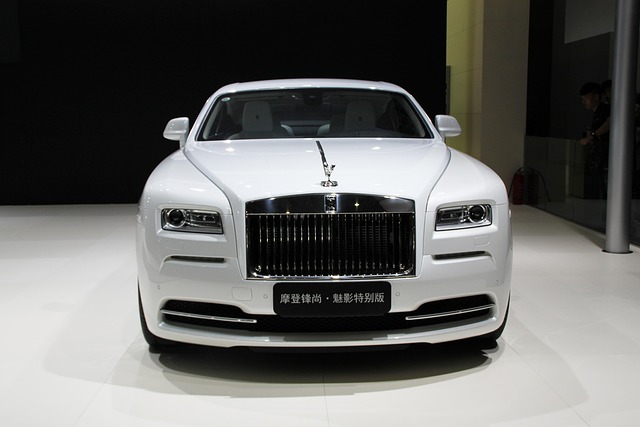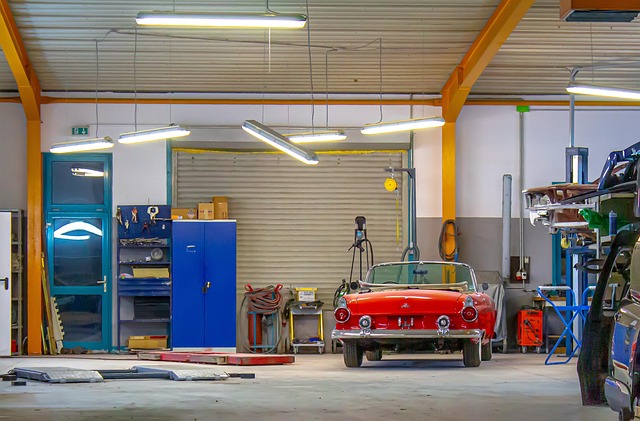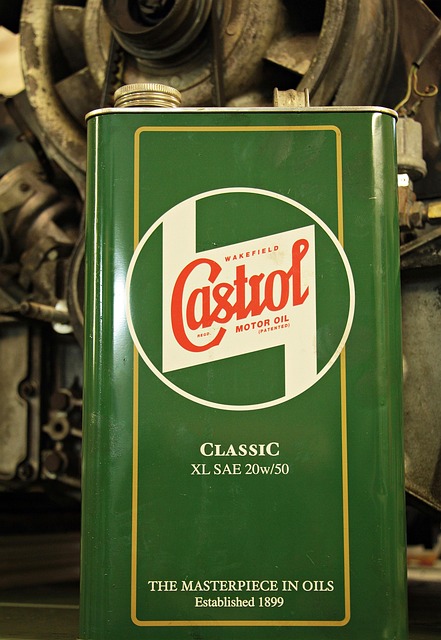Mercedes Certified Technicians: Experts in High-Voltage EQ System Repairs
Mercedes certified technicians are pivotal in the rapidly expanding electric vehicle (EV) sector, of…….
Welcome to an in-depth exploration of a vital component within the automotive industry—Mercedes certified technicians. This article aims to shed light on the specialized professionals who play a crucial role in maintaining and repairing one of the world’s most renowned luxury vehicle brands, Mercedes-Benz. We will navigate through various facets, from their training and certification process to their global impact, economic significance, and the technological advancements they drive. By the end, readers will grasp the multifaceted nature of these technicians and their influence on both the automotive sector and the broader economy.
Mercedes certified technicians, often referred to as skilled mechanics or specialized repair experts, are individuals who have undergone extensive training and earned certification to service and maintain Mercedes-Benz vehicles. These technicians possess a deep understanding of the brand’s complex engineering, cutting-edge technology, and meticulous craftsmanship. Their primary role is to ensure the optimal performance, safety, and longevity of Mercedes cars through precise diagnostics, repairs, and maintenance.
Certification for these technicians involves several critical components:
Training Programs: Aspiring certified technicians begin their journey by enrolling in specialized training programs offered by Mercedes-Benz or authorized educational institutions. These programs cover a wide range of topics, including engine mechanics, electrical systems, transmission, and the unique features found in Mercedes vehicles.
Practical Training: Hands-on experience is a cornerstone of their education. Students learn through disassembling and reassembling vehicle components, performing diagnostics, and repairing various systems under the supervision of experienced mentors.
Written and Practical Exams: Upon completion of training, candidates must pass rigorous written and practical examinations to demonstrate their proficiency. These exams assess their knowledge of Mercedes-Benz systems, troubleshooting skills, and ability to perform complex repairs.
Ongoing Professional Development: Certification is not a one-time event. Certified technicians are encouraged to stay updated through continuous professional development programs, ensuring they keep pace with technological advancements and changes in vehicle models.
The concept of specialized automotive technicians has evolved over the years, driven by increasing complexity in vehicle technology. Mercedes-Benz, known for its innovation and precision engineering, recognized the need for highly skilled professionals to service their vehicles effectively. In response, they established rigorous training programs and certification standards, ensuring that only those with the highest competence could identify as Mercedes certified technicians.
Mercedes-Benz’s global presence has created a demand for certified technicians worldwide. These experts are not limited to Germany but can be found in every continent, ensuring that Mercedes vehicles receive the specialized care they deserve no matter their location. This international network of technicians contributes to the brand’s reputation for exceptional customer service and vehicle reliability.
Several global trends significantly impact the role and development of Mercedes certified technicians:
Globalization of Automotive Standards: The harmonization of automotive standards across borders has made it easier for technicians from one country to work on vehicles in another, fostering a more unified global automotive industry.
Technological Convergence: As vehicles become increasingly connected and automated, the work of certified technicians is evolving. They must now possess skills in software engineering, electronics, and computer systems to service advanced features like infotainment systems, driver assistance, and electric propulsion.
E-Mobility Revolution: The rise of electric vehicles (EVs) presents both challenges and opportunities for these technicians. While they require additional training on battery technology and charging systems, the shift to EVs also opens new avenues for specialized work as the global EV market expands.
The global automotive service market, which includes the segment for Mercedes certified technicians, has experienced steady growth. According to a 2022 report by Grand View Research, the market size was valued at USD 498.5 billion in 2021 and is expected to grow at a compound annual growth rate (CAGR) of 7.7% from 2022 to 2030. Mercedes-Benz’s premium positioning within the luxury car segment contributes to this market’s overall health.
The investment in training and certifying technicians is a strategic move for Mercedes-Benz. By fostering a skilled workforce, the company enhances its brand reputation and ensures customer satisfaction. This investment also has economic implications:
Reduced Training Costs Over Time: Well-trained and certified technicians require less supervision, leading to cost savings for the company in the long run.
Enhanced Service Quality: Higher levels of technician proficiency result in better service quality, attracting and retaining customers who value reliable vehicle maintenance.
Competitive Advantage: In a crowded market, Mercedes-Benz’s commitment to technician training sets it apart from competitors, strengthening its market position.
One of the most significant technological shifts impacting Mercedes certified technicians is digitalization. Modern Mercedes vehicles are increasingly connected, with advanced onboard diagnostics, telematics, and infotainment systems. These technologies enable technicians to access vehicle data remotely, perform diagnostic tests, and even predict potential issues before they occur.
Example: The Mercedes-Benz MBUX (Mercedes-Benz User Experience) system, introduced in 2018, offers a sophisticated user interface with natural language processing capabilities. Technicians can use MBUX to access vehicle data, perform diagnostics, and provide customers with real-time updates on service procedures.
Technicians now have access to cutting-edge diagnostic tools that allow for more precise and efficient troubleshooting. These include:
Onboard Diagnostic Systems (OBD): Modern vehicles’ OBD systems provide a wealth of data, enabling technicians to identify issues with engine performance, emissions, and other critical systems.
Laser Scanners and 3D Imaging: These tools assist in complex repairs by providing precise measurements and visual representations of vehicle components.
Robotic Repair Systems: Some advanced repair tasks are now automated, improving efficiency and reducing the risk of human error.
Looking ahead, Mercedes certified technicians will continue to embrace emerging technologies:
Artificial Intelligence (AI) and Machine Learning: AI-powered diagnostic tools can analyze vast amounts of vehicle data to predict potential issues, enhancing preventive maintenance practices.
Augmented Reality (AR): AR headsets could provide technicians with step-by-step repair instructions overlaid on the actual vehicle, simplifying complex procedures.
Autonomous Vehicles: While Mercedes-Benz currently focuses on advanced driver assistance systems (ADAS), future developments in autonomous driving will require new skill sets for technicians to service and maintain these revolutionary vehicles.
Mercedes certified technicians operate within a complex web of regulations and policies that vary across jurisdictions. These include:
Safety Standards: Technicians must adhere to safety standards set by regional authorities to ensure vehicle repairs do not compromise safety systems.
Environmental Regulations: Strict emission control laws require technicians to stay updated on the latest technologies to meet environmental standards during service and repair.
Data Privacy Laws: With the increasing digitalization of vehicles, data privacy regulations govern how technician tools and software handle customer data.
Several countries have implemented policies to support and regulate the work of automotive technicians:
Licensing and Certification Programs: Many nations require technicians to obtain licenses or certifications to perform certain tasks, ensuring a minimum level of competence.
Industry Associations: Organizations like the International Organization for Standardization (ISO) develop standards for automotive service quality, providing guidelines for technician training and certification.
Continuous Professional Development Requirements: Some jurisdictions mandate ongoing training to keep technicians updated with industry advancements.
Mercedes certified technicians encounter several challenges in their day-to-day work:
Rapid Technological Change: Keeping up with the rapid pace of technological advancements can be demanding, requiring continuous learning and adaptation.
Specialized Training Needs: The unique features and systems found in Mercedes vehicles necessitate specialized training, which can be resource-intensive for both technicians and employers.
Competition from Generic Technicians: In some regions, generic mechanics with less specialized knowledge may undercut certified technician rates, creating a competitive challenge.
Criticisms of the certification process include:
Cost of Certification: The initial training and examination costs can be a barrier for aspiring technicians, especially in regions with lower average incomes.
Geographical Inaccessibility: Training programs may not be readily available in all regions, limiting access to specialized education.
Outdated Certification Periods: Some critics argue that certification periods should be shorter to reflect the rapid pace of technological change.
Actionable Solutions:
Scholarship Programs: Mercedes-Benz and industry associations can offer scholarships to offset training costs, encouraging more individuals to pursue certification.
Online Training Platforms: Developing digital training platforms with interactive modules can improve accessibility and reduce geographical barriers to learning.
Regularly Updated Certification Periods: Adjusting certification renewals to align with significant technological milestones ensures technicians stay current.
Mercedes-Benz Singapore implemented a comprehensive technician training program, recognizing the importance of skilled labor in a competitive market. They established a state-of-the-art training center equipped with the latest tools and simulators. The program focused on both theoretical knowledge and hands-on experience, resulting in:
Increased Service Quality: Certified technicians provided superior service, leading to higher customer satisfaction ratings.
Reduced Repair Times: Efficient training prepared technicians to complete repairs faster, improving workshop productivity.
Technician Retention: The program’s success attracted and retained top talent, reducing turnover rates.
In Germany, the tradition of Meister programs has long been recognized as a pinnacle of vocational education. Mercedes-Benz actively supports these programs, which combine rigorous training with apprenticeships. The result is highly skilled technicians known for their precision and expertise. This approach has contributed to:
Reputation for Quality: German Meister technicians are renowned globally for their exceptional work, enhancing Mercedes-Benz’s brand image.
Continuous Innovation: The program fosters a culture of continuous learning, ensuring technicians stay at the forefront of technological advancements.
Economic Impact: Skilled technicians drive economic growth by supporting local businesses and contributing to Germany’s reputation as an automotive hub.
The future holds promising prospects for Mercedes certified technicians:
Emerging Markets: As Mercedes-Benz expands its reach into new markets, particularly in Asia and Africa, there will be a greater demand for skilled technicians to support these regions’ growing automotive sectors.
Electric Vehicle (EV) Service: With the increasing adoption of EVs, specialized training on battery technology and charging systems will become essential, creating new opportunities for certified technicians.
Autonomous Vehicles: As autonomous driving moves from concept to reality, technicians will play a crucial role in maintaining and servicing these revolutionary vehicles.
Technicians should prepare for these emerging technologies:
Advanced Driver Assistance Systems (ADAS): The continued development of ADAS requires technicians with specialized knowledge to service and repair related components like sensors and cameras.
Connected Vehicles: As vehicles become increasingly connected, technicians must understand cybersecurity protocols to protect against potential cyber threats.
Alternative Fuel Sources: Beyond traditional internal combustion engines, technicians will need to familiarize themselves with fuel cells, electric motors, and other alternative propulsion systems.
Mercedes certified technicians are not just mechanics; they are the backbone of a sophisticated global network ensuring the smooth operation of Mercedes-Benz vehicles worldwide. Through rigorous training, certification, and ongoing professional development, these technicians uphold the brand’s reputation for excellence. As technology continues to shape the automotive industry, their role will evolve, requiring adaptability and a commitment to lifelong learning.
The future holds immense potential for these professionals, with emerging markets, electric mobility, and autonomous vehicles presenting new challenges and opportunities. By embracing technological advancements and staying at the forefront of industry trends, Mercedes certified technicians will remain indispensable in shaping the automotive landscape of tomorrow.
Q: How do I become a certified Mercedes technician?
A: To become a certified technician, you typically need to complete an authorized training program, pass written and practical exams, and maintain your certification through ongoing professional development.
Q: Is it difficult to keep up with the latest technology in automotive repair?
A: Yes, the rapid pace of technological change can be challenging. However, continuous training programs and industry associations help technicians stay current with the latest advancements.
Q: Can I earn a good salary as a Mercedes certified technician?
A: Absolutely! Skilled technicians are highly valued, and their expertise often translates to competitive salaries and benefits, especially in regions with a high demand for specialized automotive services.
Q: What role do Mercedes certified technicians play in the development of electric vehicles?
A: They are crucial in servicing and maintaining electric vehicles, including battery technology, charging systems, and advanced electronics, as the global shift towards electrification gains momentum.
Q: How does globalization affect the work of these technicians?
A: Globalization enables technicians to work across borders, fostering a more unified automotive industry. It also exposes them to diverse vehicle models and standards, enhancing their skill sets.

Mercedes certified technicians are pivotal in the rapidly expanding electric vehicle (EV) sector, of…….

Mercedes Certified Technicians are highly skilled professionals trained by Mercedes-Benz to provide…….

After a Mercedes accident, specialized Mercedes certified technicians are crucial for effective coll…….

Mercedes certified technicians, rigorously trained and equipped with factory-approved tools and genu…….

Mercedes certified technicians are highly trained professionals who play a crucial role in maintaini…….

Mercedes certified technicians are highly skilled professionals who specialize in restoring luxury v…….

Mercedes certified technicians are indispensable experts specializing in AMG and EQ performance mode…….

Mercedes certified technicians play a crucial role in maintaining the safety and reliability of Merc…….

Mercedes certified technicians are highly skilled professionals specializing in intricate systems of…….